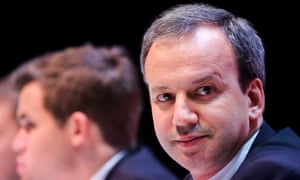
A
fter Saudi Arabia was stripped of the right to hold a major chess tournament this month, organisers quickly struck a deal with Riyadh to move the event somewhere less politically divisive: Russia.
The last-minute swap was negotiated by Arkady Dvorkovich, a former Kremlin aide who was recently elected president of the world chess federation Fide and has promised to make the game’s leadership more transparent.
Dvorkovich, a modern technocrat who managed sectors of Russia’s economy and its World Cup organising committee, won the chess post in a contentious election featuring accusations of vote-buying and government meddling. Since then, close attention has been paid to how the business and politics of the sport may be transformed under his command.
“This particular situation is a force majeure. It won’t be a normal practice that we will just take a tournament and put it in Russia,” Dvorkovich told the Guardian during an interview at an upscale Moscow restaurant on the eve of the tournament. “But Russia is a country with a great chess tradition … I just know that if I will have a problem with hosting any tournament, Russia can always help.”
The last-minute deal to move the 2018 King Salman World Rapid and Blitz Chess Championship capped a year of growing international pressure on Riyadh. Long before the murder of Jamal Khashoggi, the country was condemned in chess circles for denying visas to Israeli players in 2017.
With similar concerns over this year’s tournament, Fide abruptly announced the change in venue but said Saudi Arabia would remain the sponsor of the championship.
In October, Russia saved Riyadh from public embarrassment by sending a large delegation of officials and businessmen to an investment conference that was abandoned by US and European investors.
On a smaller scale, moving the chess tournament did the same. Dvorkovich declined to go into details of the deal, in which St Petersburg edged out other contenders such as Dubai in ad-hoc negotiations, but said it was decided mutually with the Saudi Arabian chess federation.
The tournament features some of chess’s biggest stars, including Magnus Carlsen and Viswanathan Anand. In opening remarks, Dvorkovich said there would be no pork or alcohol at the event, according to a reporter for chess.com.
The deal is an early test of Dvorkovich’s capacity to manage the complex organisational and political challenges of international chess. He ran on a platform of increased transparency and expanding Fide’s modest budget. His administration has claimed it can increase sponsorship tenfold in the coming year.
But Dvorkovich’s anti-corruption campaign was overshadowed in the media by a significant lobbying effort by the Russian government, including embassies, encouraging national chess federations to back his candidacy.
In the interview, he confirmed details reported in the Guardian about the diplomatic effort but claimed it was nothing unusual. “I was accused of support that Russian president and government gave me during the elections,” he said. “It was funny for me because it’s normal. It’s normal if they support publicly Russian candidates. It’s not about bribing someone or doing something wrong. They announced public support for a professional who wants to run the organisation.”
In assuming the Fide presidency, Dvorkovich went from managing an estimated $14bn (£11bn) effort to prepare for Russia’s World Cup to running an embattled organisation with a budget of just €5.5m for 2019.
But he joined a small fraternity of Russian federation heads at a time when international sport has grown increasingly political, particularly following doping scandals in the 2014 Sochi Olympics.
“There aren’t many of us,” he noted, including the heads of fencing, sport shooting and Sambo, a Russian martial art.
“I have to protect interests of all member federations, it’s not only about Russia,” Dvorkovich said, when asked how his administration could improve Russia’s image abroad. “But if we can show good results, that also influences Russia’s image positively.”

No comments:
Post a Comment